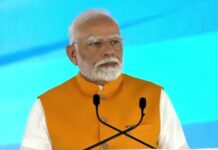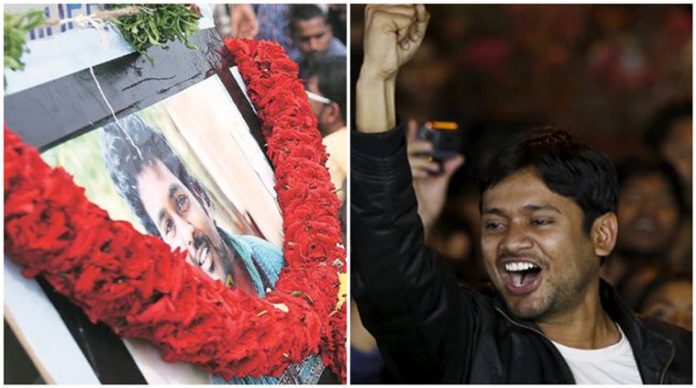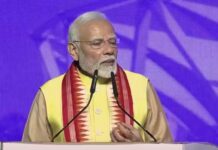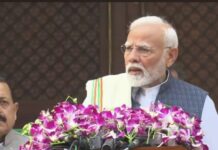THE CONGRESS, SP and BSP may speak up in Parliament, but on the ground, in Uttar Pradesh, they appear subdued by the BJP’s aggressive framing of the Jawaharlal Nehru University (JNU) issue as a shorthand for a resetting of political focus on the “enemy within”.
As the BJP tries to draw a broader polarisation between “us” the nationalists and “them” the anti-nationals/ Leftists/ Islamists/ political opponents of the Modi regime/ Indian Muslims, non-BJP parties can be said to be looking on, at best.
There is little or no attempt to challenge the BJP on JNU, either on its own ground, or by articulating the issue as one that involves freedom of expression, or the university’s autonomy.
In fact, the sharpest admonition to the Modi-led party and government on the JNU issue comes not from any of the BJP’s political opponents but from someone who could be said to preside over its prime political property — it comes from Acharya Satyendra Das, mukhya archak or head priest of the makeshift Ram temple in Ayodhya. But more on that later.
First, the Congress. The party that is generally unwilling and mostly slow to take the political initiative in UP, especially on “Hindutva” issues, is seen to be on the backfoot on JNU, ever since vice-president Rahul Gandhi dropped in on the campus to express solidarity with the protesting students.
In the “mandiron ki nagri”, city of temples, of Varanasi, the last time the Congress roused itself to a state of agitation, was, ironically, when it joined the BJP in marching with the sadhus, sants and religious groups in October 2015 to protest against the administration’s implementation of an Allahabad high court ban on the immersion of idols in the Ganga.
The arrest of Congress MLA Ajay Rai at that time, for alleged involvement in mob violence, continues to be uppermost on the Congress’s mind here, which has mounted no public mobilisation so far on the JNU issue.
“We have organised a signature drive and demonstrations on Ajai Rai’s arrest. He did no wrong. It was a consensus issue, both Congress and BJP MLAs walked behind the sadhus,” says Satish Rai, Congress district spokesperson and professor at the Kashi Vidyapeeth.
When the Congress in Varanasi does speak on JNU, it invites attention to a constricted space for manoeuvre: “Arrest the guilty in JNU, but leave those you don’t have proof against, and find out if the video is concocted,” says Rai. “It remains to be seen if this becomes an election issue, but the general sentiment of the people is against JNU,” says Ratnakar Tripathi, former all-India joint secretary, NSUI.
“It’s a sentiment you cannot avoid. People are hurt, they feel how can you raise such slogans. They want to know why the Modi government is not taking action against the students. Rahul Gandhi said there must be freedom of expression, but I feel it cannot include the right to abuse your father or your mother.”
The Congress’s sharpest contention on JNU skirts the issue: “The BJP is raising it only to divert from the fact that the Modi market is collapsing, his government is losing popularity even in his own constituency,” says Tripathi.
When Modi filed his nomination from Varanasi, a sea of people had turned out for him, and “it took six-seven hours for the procession to cover five kilometres,” recalls Tripathi. But now, “the BJP has to issue public appeals in order to draw in crowds when he comes here,” he says.
“Varanasi was a symbol of the Modi lehar (wave),” says Rai. “But his government has done nothing so far. Even the cleaning of the Assi Ghat was by private initiative, the government only tried to take the credit for it later.”
In Muzaffarnagar, Pankaj Agarwal, chairman, Nagar Palika Parishad, and the defeated Congress candidate in the 2014 Lok Sabha polls, sums up the Congress’s best hope: “Modi can be felled only by Modi, or by his own party, not many will listen to us here. It will happen. In India, nothing remains on top forever. Even Indira Gandhi lost power, and then swept back.”
SP leaders in Varanasi, Faizabad, and Muzaffarnagar articulate a much more pointed opposition to the criminalisation of slogan-shouting students and BJP attempts at a new polarisation. But they seem circumscribed by their supreme leader Mulayam Singh Yadav’s intervention in Parliament — Netaji spoke of “vaicharik bahas”, the contestation of ideas, but emphasised that “those raising anti-national slogans cannot be forgiven” and demanded “badi se badi sazaa (the strictest punishment)” for them.
In Faizabad, this has meant that SP “sympathisers” organised a meeting to counter the BJP-ABVP offensive and to demand JNUSU president Kanhaiya Kumar’s release, but officially, the SP stayed away.
According to Suryakant Pandey, former SP state committee member, who runs the “Shaheed Shodh Sansthan” which participated in the event, “The SP is neutral on the issue. I don’t think that is right. It cannot be anti-national to raise slogans”.
Vinay Maurya, district president of the SP’s student wing, who attended the programme, says: “I was there, but not as a representative of the party. I think my party should speak, this is an issue for the young. BJP-ABVP are spreading their lies through repetition, and if it takes two minutes for the BJP-ABVP to get their message across to the people, it takes us twenty”.
The JNU issue is “more dangerous than mandir,” says Pandey. Because “nationalism vs anti-nationalism” divides everyone and is the last resort of “tanashahi (the dictatorial regime),” he says.
BSP leaders and office-bearers say they await Behenji’s “nirdesh”, when asked about JNU. “Behenji speaks on everything, we follow her,” says Avnish Kumar, mandal coordinator, in Varanasi. In Muzaffarnagar, Abhishek Chaudhary, former vice-president of BSP’s district unit, explains: “Our party does not speak on these issues. We made no statements even when so many people died in the riots here.”
By all accounts, Mayawati, who has spoken clearly and strongly in Parliament on the controversy surrounding the suicide of Dalit student Rohith Vemula in Hyderabad University, is yet to visibly lay down the party line on JNU.
In UP, then, it would appear to be left to Satyendra Das, mukhya archak or head priest of the makeshift Ram temple in Ayodhya, to warn the BJP that “vish failega”, the poison will spread, if it politicises the issue.
The BJP, he says, “will make it (JNU) an issue if they feel they stand to gain from it politically, and because Rahul Gandhi went there”. But that would be “chhoti aur galat soch”, small and wrong-minded. The JNU issue “should not be taken forward, projected or spread politically,” he says.
The acharya is certainly no advocate of freedom of expression: “If asking for the country’s dismemberment, or praising Afzal Guru is not anti-national, then what is? Language that hurts the nation is desh droh” and the students must be punished by law, he says. His insistence that the law, not politics, take its course on JNU contrasts conspicuously with his position on the demolition of the Babri Masjid: “There was never a masjid there, only a mandir”.
Satyendra Das’s criticism of the BJP’s politicisation of JNU is only a welling up of his deep bitterness over what he sees as the party’s abandoning of the grand Ram temple project due to its political compulsions: “They say we must wait till we get 370 MPs, a two-thirds majority. The PM can do it, but he is not interested. The BJP is insulting that which brought it to power,” he says.
Yet come to Ayodhya to hear the warning bells toll on the BJP’s attempts to work up “desh bhakti” into the new “mandir”.
Source : Indian Express






























